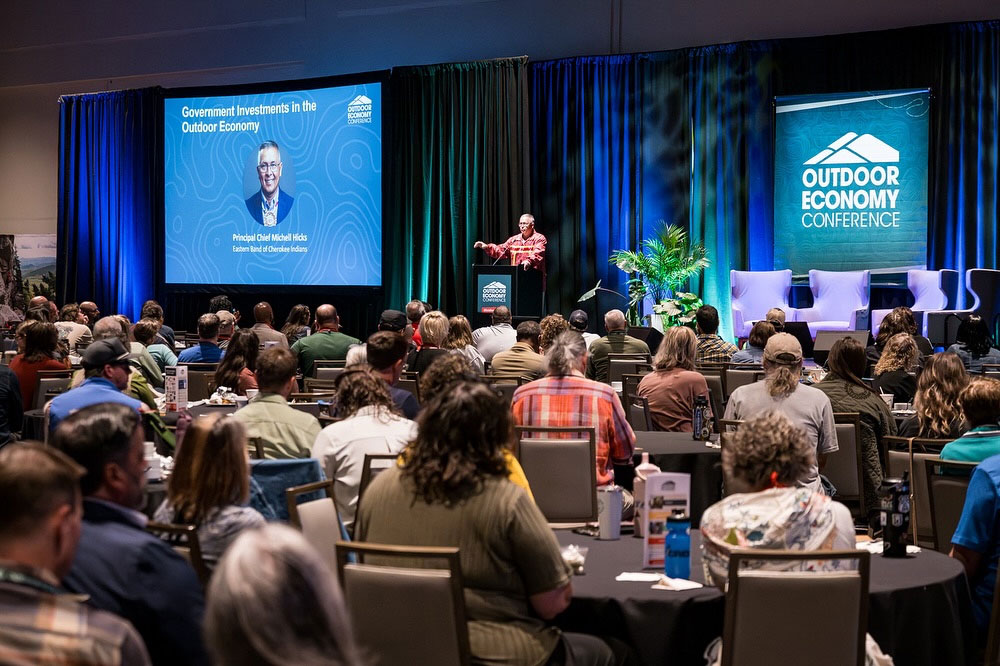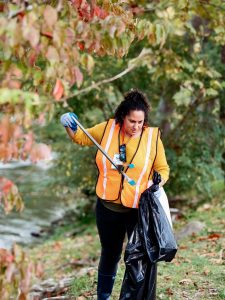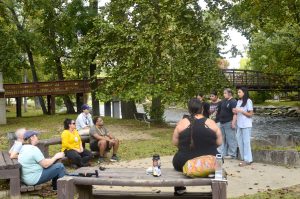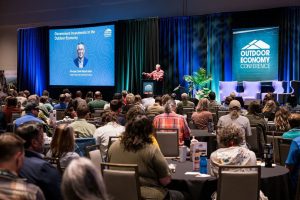
Born from the high, cold springs of Great Smoky Mountains National Park and destined for the Gulf of Mexico, the clear waters of the Oconaluftee River have a long journey ahead. The river flows through the Eastern Band of Cherokee Indians’ homeland in Cherokee, North Carolina, and joins increasingly voluminous waterways as it travels toward the sea. The Cherokee know this southbound path as the Long Person, yvwi ganvhida—a living being with its head in the mountains and its feet in the sea.

“Water has always been something that has kept our community together and going,” said EBCI citizen Jasmine Smith, 15, chair and co-founder of the youth-led North American Indian Women’s Association Daughters. “Water is life, and without it we’re not going to be able to continue anything.”
Smith spoke before a river cleanup effort that NAIWA Daughters organized in conjunction with the sixth annual Outdoor Economy Conference, which drew a record of more than 700 people from 37 US states to Cherokee, North Carolina, September 15-18. As with other waterways in the region, the Oconaluftee plays an important role in the outdoor recreation economy, but its importance transcends dollars and cents. The river provides drinking water, wildlife habitat, spiritual renewal, inspiration, and flood mitigation.
To the Cherokee, the river is a living being deserving of care and respect—even reverence. Traditionally, Cherokee people would go there at dawn to pray, asking the Long Person to take away feelings of greed and relieve them of harm, according to Juanita Wilson, an EBCI member and the Tribe’s training and development manager, who spoke at the cleanup. In return, she said, they would give the river space to live, adapting to it rather than changing it to adapt to human activities.

“There were certain taboos,” Wilson said. “You don’t relieve yourself in the river. You don’t clean your kill. You don’t throw any trash at all. You honor it. It’s giving you medicine.”
With each cigarette butt or plastic water bottle they picked up, the ten conference attendees who participated in the river cleanup followed this ancient ethos, gathering 40 pounds of litter and adding to the impact of the Honoring Long Person cleanup held earlier that month. Wilson has organized the annual event, previously known as “Honoring Long Person,” since it began in 2021, removing more than four tons of trash from the riverside in Cherokee.
Dedicated stewardship like this was highlighted throughout the 2025 conference; the theme, “Investing in the Ecosystem,” encompassed much more than monetary returns.
“The outdoor economy is more than gear and trails,” Amy Allison, director of the NC Outdoor Economy Office, said during the September 16 morning keynote session at the Cherokee Convention Center. “It’s people, it’s place, it’s purpose, and this week we’re going to explore what it means to continue to invest in our outdoor ecosystem with our time, our energy, and our communities.”

The morning’s keynote speaker was Lesford Duncan, executive director of the Outdoor Foundation. With a degree in biology and graduate training in public health systems, he describes himself as “the world’s most unlikely economist.” Though ecology and economy are rarely thought of in tandem, Duncan sees strong parallels between the two.
“Both are in the business of tracking flows,” he said. “Economists follow the flow of money; ecologists trace the flow of energy, nutrients, and relationships. Both are about systems of exchange—systems that only thrive when balance is possible.”
When it comes to building a strong economy, the natural world is a “powerful teacher,” he said, pointing to the forest as an example. Aboveground, individual trunks and branches reach high in search of light, while belowground a vast and interconnected network of roots and fungi exchange nutrients, send warnings, or even feed younger or weaker trees.
“It is cooperation disguised as competition,” Duncan said. “Strength comes not from standing alone, but from the sharing that happens beneath the surface.”
Nothing has brought that lesson home more viscerally than Hurricane Helene, which devastated much of the Southern Appalachian region in September 2024. The disaster dumped 20 to 30 inches of rain across a large swath of Western North Carolina with double-digit totals in four other states, a report from the National Hurricane Center found. The resulting floods coupled with powerful wind gusts caused at least 250 deaths, 108 of them in North Carolina. Helene triggered more than 2,000 landslides and caused $78.7 billion in damage, destroying entire communities.
Left without working cell networks, potable water, or any readily available road map to normalcy, Appalachian communities had to put aside their differences and lean on each other to find a way forward.

After the initial emergency response phase was over, rebuilding outdoor infrastructure emerged as a priority for the future. Not only is the outdoor industry a key economic driver in the mountain region, but the peace and healing that can come from time outdoors became even more important in the wake of disaster.
“There’s a lot of trauma in disaster, and so we really do need places of beauty to help us connect back to the land,” Bradley Spiegel, a community planner for Asheville-based Equinox Environmental, said during a session titled “Scaling Resilience: Building Stronger and Safer Communities Through Outdoor Recreation.”
According to the US Department of Commerce Bureau of Economic Analysis, in 2023, outdoor recreation added $16.2 billion to North Carolina’s economy and $13 billion in Tennessee. A National Park Service study found that in Great Smoky Mountains National Park gateway communities alone, park visitors spent an estimated $2.2 billion in 2023, supporting 33,700 jobs. Storm damage forced public trails, roads, and facilities to close, making travel difficult for visitors, survival difficult for businesses, and the search for peace difficult for survivors.
“If I can see a squirrel or hear a bird, or maybe a turkey or an eagle fly by, my day is made, and that’s what it’s all about,” said EBCI Principal Chief Michell Hicks as he welcomed conference attendees to the Cherokee homeland. “It’s about the tranquility, about being in touch with the outdoors.”

Over the past year, much progress has been made. Debris has been cleaned from rivers, trails have been rebuilt, and businesses have reopened. As of September 15 the Blue Ridge Parkway is now completely open from its southern terminus past Asheville, and on September 18 the last North Carolina state park to remain completely closed due to hurricane damage—Mount Mitchell State Park—reopened.
“Things truly are looking up for the western part of our state,” NC Governor Josh Stein told conference attendees. However, recovery is far from complete.
“What I try to ensure people know is that while our parks are open, there are hundreds of miles of trails that are still impacted by Helene, and it is going to take us a lot of time to get all of them back open again,” said NC Secretary of Natural and Cultural Resources Pam Cashwell.
Even in Great Smoky Mountains National Park, which was spared the brunt of Helene’s wrath, trail and road closures remain in the Balsam Mountain, Cataloochee, and Big Creek areas on the North Carolina side of the park, and work is ongoing to repair damage to some historic buildings.

Recovery will take continued investment in both environmental and economic ecosystems, but if this year’s record-breaking conference attendance is any indication, interest is high in making that commitment. True success is measured not just in ease of living today, said Smith of NAIWA Daughters, but in the health and happiness of people yet to be born.
“Everything we do is not just for us; it’s done for the next generation,” she said. “So preserving our waters now is our gift and responsibility for generations in the future. And that’s really what’s keeping us going: the ability to connect with our Ancestors through our waters, recenter our traditional teachings, and incorporate them through everything we do in the modern day.”
Subscribe to get the latest posts sent to your email.
The Great Smokies Welcome Center is located on U.S. 321 in Townsend, TN, 2 miles from the west entrance to Great Smoky Mountains National Park. Visitors can get information about things to see and do in and around the national park and shop from a wide selection of books, gifts, and other Smokies merchandise. Daily, weekly, and annual parking tags for the national park are also available.